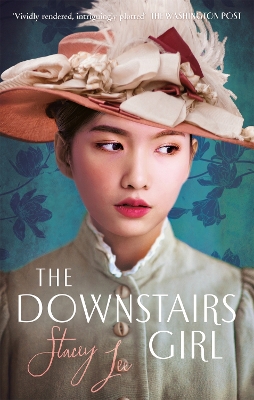Reviewed by nannah on
Another find at the huge local library sale! I was intrigued because I haven’t read much YA historical fiction that wasn’t also fantasy--and because Stacey Lee is a founder of We Need Diverse Books, and I was absolutely obsessed with that site and its mission when it came out. It probably caused my interest to swing toward YA from adult (funnily enough, I never read YA when I was an actual young adult).
Content warnings:
- period-accurate racism & sexism
- sexual assault; CSA in particular
- fetishization
Representation:
- Chinese-American protagonist
- Chinese-American secondary protagonist
- Black secondary protagonist
When the newspaper that 17yo Jo Kuan loves needs more subscribers, she anonymously sends them advice columns as “Miss Sweetie”--signing it in her real name as an Asian girl in the New South would be dangerous. As her column begins to address riskier topics, interest in the identity behind Miss Sweetie grows from both fans and new enemies. But Joe has an interest in her own identity and in the parents who abandoned her as an infant, and the lessons she’s learned from being Miss Sweetie might be able to help her when that search draws the attention of a ruthless criminal.
Right away I was impressed with the writing style and quality (actually, even the dedication made an impact). I was also taken with all the witty lines and turns of phrases. Stacey Lee can certainly write good ones, but maybe she could use them more sparingly, because they can get to be a little exhausting.
But speaking of what Stacey Lee can write well, her characters are very memorable. Old Gin, in particular, is one of the warmest and most realistic characters I’ve read in a long time. With faults and strengths and a huge (but not overdone) personality, he stole every scene he was in--as well as played off other characters well. Jo’s employer and the lady she served were also well written--actually, there were very, very few people in this novel I didn’t love or find interesting.
I’ve also loved this look into what life for an Asian-American immigrant would have looked like in the New South (Alabama, ~late-ish 1800s, I think? I don’t have the book with me). My education on this time period before reading was mostly been limited to black and white, so this has been very valuable--and if it has been valubale for me, I can’t imagine how wonderful it is for Asian-American young adults.
But, of course, there are things I didn’t like …
This book contains one of my “quadruple-p’s”, or period-piece-pet-peeves: when characters’ lines sound way too modern for the time period they’re in. This is definitely more common in YA than adult fiction … perhaps done to appeal to modern readers? Or to sound like the latest Marvel/blockbuster, maybe? Or perhaps because it’s so commonplace and in fashion now that the author might not have considered it at all? I feel as though every “best friend” character in YA (the main offender of this pet peeve), despite the setting, has a similar personality, one that lends itself to more modern dialogue; it might be almost automatic at this point for them to speak this way. I could be thinking way too much into this, though. And considering it is one of my major pet peeves, this book really didn’t bother me with it all that often. It’s just that when it did, it stuck out terribly.
Now this is a bit strange to admit, but thinking back on it, this is way worse an issue now than it was while reading. But the plot might be a little bit of a mess. There’s too much going on in a single novel. Besides Jo’s search for her family/identity and her secret job writing anonymously for an advice column in the newspaper (despite having no prior experience or aspirations for writing in general and despite her previous dream of becoming a hatter that she may have forgotten about), there’s the romantic side plot and there's the mystery surrounding what her (step?)father/guardian might be involved with, and then suddenly she’s able to race horses to grapple with the newest plot point, etc. It just gets to be a lot.
I also did not like the way sexual assault starts to be used as a plot device. First, it helps Jo bond with Caroline, the hateful lady she serves--through brief flashbacks, which would be okay by itself. But then when Jo tries to get information from the villain, he’s in the middle of taking a bath. Not only does he (spoiler for sexual assault) stand up and grab her hair, but he gets an erection and moans . It goes from very YA to adult way too fast. I’m not saying YA can’t have this kind of content (or especially have conversations about it, because this happens to kids!), but there was very little discussion about it afterward, either, besides Jo telling her best friend, who said she’d smack [the antagonist] with a Bible. And that was that, I guess.
Stacey Lee seems like a wonderful person, but I almost enjoyed her very heartfelt acknowledgements and her author’s notes more than the book. Then again, I’m learning I might just be done with YA for the most part. I’ll have to wait to see if the YA authors I like ever write outside the genre. Till then I’ll support them in other ways!
(And although I know this probably isn’t Stacey Lee’s doing, the inner novel design is gorgeous! I’m in love with those illustrations.)
Reading updates
- Started reading
- 9 October, 2022: Finished reading
- 9 October, 2022: Reviewed
